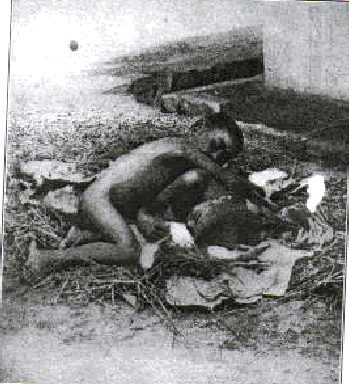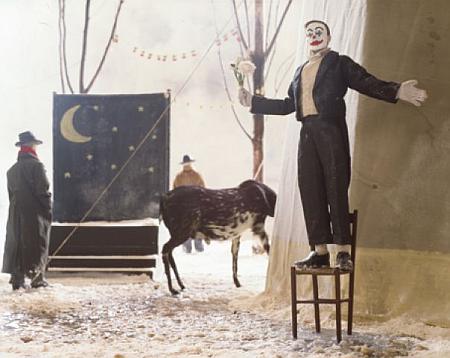Friday, December 25, 2009
Nine: A Little Shake Shake After Christmas
Friday, December 18, 2009
Fantasy Feature No. 4
Tuesday, December 15, 2009
The Machine, It Just Doesn't Stop

The first one we watched was centered around Francisco Goya's "May 3, 1808," which depicts the execution of those thought to be involved in an uprising against Napolean's army. (I say "those thought to be involved" because any man with a weapon was rounded up and executed). In the painting, the men are shot and also stabbed to be sure they died. During the episode, a really interesting discussion about the soldiers ensues. They are described as a machine and x-rays of the painting shows how they were sort of "stroked" together as one, particularly hard and fast brushstrokes given to their guns. The soldiers' faceless posture, their boxy yet triangular stance, pushing forward yet hiding behind their weapons, hiding behind some form of democracy they were supposed to represent made me kind of wonder where everyone's descendants are. Where are the children of those who died? What are they doing now? What happened to those soldiers?
I Like It The Other Way
Friday, December 11, 2009
Fantasy Feature No. 18
Thursday, December 3, 2009
Holy shit. Claire Hero.
Sunday, November 29, 2009
I've Been Saltered
Friday, November 27, 2009
Airplane Movie Reviews
Monday, November 23, 2009
"'Bout the rebel yell, 'bout the one that fell..."

Thursday, November 19, 2009
It's No Seven-Up, But It's Fascinating
Tuesday, November 17, 2009
Syllabus: Samurai Films

Films:
Sunday, November 15, 2009
There's More in the Fridge If You Want Some
Tuesday, November 10, 2009
Please Don't Change That Grit

Streamers hang from a string of lanterns and confetti is peppered about the floor, along with balloons that have lost their umph. Be careful that you don't step on the sword that also rests on the floor. Did someone leave it there or was it thrown there? Circled about are chairs, as though people had been talking and on one chair rests a large head-mask, mustached and staring only where it can stare. The mask will return in another photograph by Paolo Ventura, as well as the sword, but in this photo, titled "2:00 a.m." the mask and sword and the room itself are at rest. The party is over, the space has been cleared, and the piano waits for people to play it once again.
Sunday, November 8, 2009
It All Started This Day Thirty Something Years Ago

Today's the day. The old man spelled "happy" across the floor with books. Health care barely passed, but it passed. In the photo my father and I are devouring a watermelon, my favorite thing to do. The only bad thing about living in the city, really, is that we don't get good watermelon here. It's always a little pink, not too hearty. If you don't agree with me, I'm driving you to Louisiana in July and you'll see. You'll say I told you so. Behind me is a white salt shaker. It's a Southern delicacy to sprinkle salt on watermelon. Those days are over for me, you know, because of my age, but I sure do miss that simple weird taste.
Thursday, November 5, 2009
The Human Zoo, Closed on Mondays
Wednesday, October 28, 2009
Visitations
Monday, October 26, 2009
I've Already Been Called a Yankee Three Times This Trip
Wednesday, October 21, 2009
Laura Marling on a Warm October Night

The old man and I went to see Laura Marling play last night at the Music Hall of Williamsburg, which used to be known as North Six. The old man and I went on our first date there, standing awkwardly next to each other as Dirty Rainbow blasted out our ear drums.
Tuesday, October 20, 2009
The Hat Box Has Come Down
Monday, October 19, 2009
More Eyes that Slant, More Woolens

We left the city yesterday in windy rainy weather for the last day of the New York Sheep and Wool Festival. For the first time I saw cashmere sheep and Leicesters (they have fur not wool), and petted some Alpaca and merino sheep. The whole thing about livestock is so weird. Livestock. When eating becomes feeding, a year before dying. We just sort of take everything from these scared little creatures: their bones become plates, their milk for cheese, their wool becomes yarn, this yarn becomes superwash merino that I'm going to knit into socks. I worked on a sheep farm and we always knew that before winter, most of the lambs would be loaded up and sent to Blood Slaughterhouse. Even my friend #4 who would ram my butt while I was changing out the water.
Friday, October 16, 2009
Children Are you Still Feral

Thursday, October 15, 2009
List: Temporal Art
- light on hair
- heirloom tomato salad
- food in teeth
- wet receipts
- nestlike pile of cat hair behind the door
- where sneezes land
- breathing newspaper in the subway
- tired eyes
- you know what
- two bikes locked together (they love each other!)
- pile of roasted vegetables, mostly orange
- falling asleep with a book
- falling asleep with a pen
- steamed milk in coffee
Monday, October 12, 2009
Tunnels Mean Something But I'm Not Sure What

Wednesday, October 7, 2009
Dumplings and Trumpets: Chris Martin
Tuesday, October 6, 2009
Fantasy Feature No. 23
Friday, October 2, 2009
Are You Still Blushing From Last Night? I Am
Thursday, October 1, 2009
Fantasy Feature No. 1
Tuesday, September 29, 2009
Love My City, Part One
Wednesday, September 23, 2009
I've Got Your Back, Flarf
Monday, September 21, 2009
Swallow This And Love It
- Poemland by Chelsey Minnis
- concord grapes
- pancake squash
- The Cow by Ariana Reines
- wheat stamp
- new orange journal
- The Malady of Death by Marguerite Duras
- Hush Sessions by Kristi Maxwell
- Mad Men, Season 2
- My Kafka Century by Arielle Greenberg
- Don't Let Me Be Lonely by Claudia Rankine
- last of the last sweet corn
Friday, September 18, 2009
Autumn With Very Little Assurance
Tuesday, September 15, 2009
Voting by way of Fascism Through Democracy

You can't tell here, but her hair is red--rrrow. She is the only woman running for city council in my district.
Chode # 2

This candidate claims he will clean up local politics. He even mailed me a picture of himself taking a broom to the street. Would he mind using said broom in the Atlantic subway stop? While there, I saw a rat so big we made eye contact.
Sunday, September 13, 2009
How to Ride an Airplane in Four Easy Steps
Friday, September 4, 2009
Syllabus: Native American Literature
Thursday, September 3, 2009
Live a Little
When the President listens to Republicans
he finds support to escalate in Afghanistan
despite the violence, no clear goal
& election fraud in the "democracy" we built.
When Senate Dems listen to the Party of No,
they consider jettisoning the public option,
making healthcare reform meaningless
& mandating a give-away to insurance companies.
When the media listens to the GOP,
we hear how much GOPpers respected Kennedy,
yet in life they slandered him as a "liberal,"
blocked his work & their activists boo him now.
So...why are we still listening to Republicans?
When their homeland security chief listened,
he manipulated threat levels for political gain.
Now, when AG Holder ignores Republicans,
he appoints an investigator into illegal torture
& puts Justice back into civil rights enforcement.
Moral of the story: ignore Republicans...
as the American people told us in '06 & '08.
Tune out the right & turn on the Left
as you join left-leaners for liberal libations
at your local progressive social club.
DRINKING LIBERALLY
Tonight - and every Thursday
7:30pm onward
Rudy's - 9th btw 44th & 45th
[back booths beneath the DL banner]
Questions: nyc@drinkingliberally.org
Tuesday, September 1, 2009
A Cup Full of Breathiness, A Droopy T-Shirt











